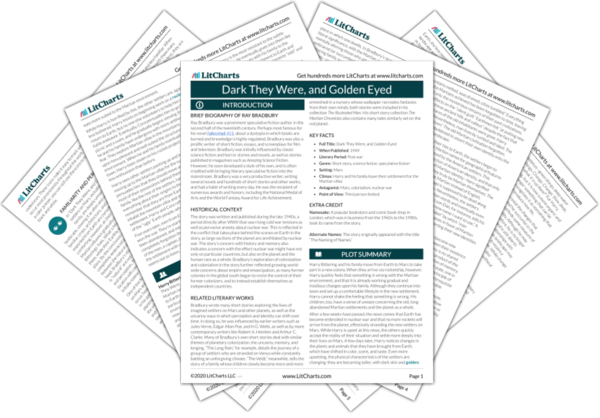From the beginning of the story, wind and mist are representative of the uncanny and the unknown on Mars. When he first disembarks onto the planet, Harry Bittering is immediately struck by the wind sweeping across the plains, reflecting that “the wind blew as if to flake away their identities. At any moment the Martian air might draw his soul from him, as marrow comes from a white bone.” Later, when connection with Earth has been severed by nuclear war, Harry is overcome by fear of the change that is embodied by the wind now that “Earth people” have been “left to the strangeness of Mars, the cinnamon dusts and wine airs.” He tries by any means available to escape back to Earth, worrying that “if we stay here, we’ll all change. The air. Don’t you smell it? Something in the air. A Martian virus, maybe; some seed, or a pollen.” Ultimately, the wind is representative of the Martian environment as a whole, something pervasive and inescapable that spreads gradual change.
The wind also symbolizes the effect that time has on history, slowly wearing away the civilization of former inhabitants until all that is left is empty buildings and sand. One of the Bittering children remarks, “I hear the wind. The sand hits my window. I get scared. And I see those towns way up in the mountains where the Martians lived a long time ago.” The wind brings not just change but slow annihilation, grinding down even huge cities to dust. In this respect, the wind has both generative and destructive capacities, symbolizing both life and death, but most of all change.
Wind and Mist Quotes in Dark They Were, and Golden Eyed
The wind blew as if to flake away their identities. At any moment the Martian air might draw his soul from him, as marrow comes from a white bone. He felt submerged in a chemical that could dissolve his intellect and burn away his past.

Unlock explanations and citation info for this and every other Dark They Were, and Golden Eyed quote.
Plus so much more...
Get LitCharts A+Earth people left to the strangeness of Mars, the cinnamon dusts and wine airs, to be baked like gingerbread shapes in Martian summers, put into harvested storage by Martian winters. What would happen to him, the others? This was the moment Mars had waited for. Now it would eat them.
“If we stay here, we’ll all change. The air. Don’t you smell it? Something in the air. A Martian virus, maybe; some seed, or a pollen.”
Lying abed, Mr. Bittering felt his bones shifted, shaped, melted like gold. His wife, lying beside him, was dark from many sunny afternoons. Dark she was, and golden-eyed, burnt almost black by the sun, sleeping, and the children metallic in their beds, and the wind roaring forlorn and changing through the old peach trees, the violet grass, shaking out green rose petals.












